The Deeper Thinking Podcast
The Deeper Thinking Podcast The Deeper Thinking Podcast offers a space where philosophy becomes a way of engaging more fully and deliberately with the world. Each episode explores enduring and emerging ideas that deepen how we live, think, and act. We follow the spirit of those who see the pursuit of wisdom as a lifelong project of becoming more human, more awake, and more responsible. We ask how attention, meaning, and agency might be reclaimed in an age that often scatters them. Drawing on insights stretching across centuries, we explore how time, purpose, and thoughtfulness can quietly transform daily existence. The Deeper Thinking Podcast examines psychology, technology, and philosophy as unseen forces shaping how we think, feel, and choose, often beyond our awareness. It creates a space where big questions are lived with—where ideas are not commodities, but companions on the path. Each episode invites you into a slower, deeper way of being. Join us as we move beyond the noise, beyond the surface, and into the depth, into the quiet, and into the possibilities awakened by deeper thinking.
Episodes
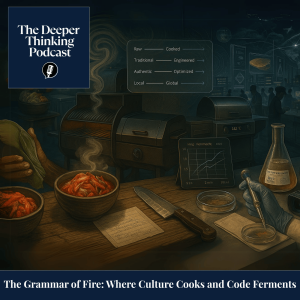
Friday Jun 06, 2025
Friday Jun 06, 2025
The Grammar of Fire: Where Culture Cooks and Code Ferments - The Deeper Thinking Podcast
The Deeper Thinking Podcast
A sensory-philosophical investigation into how we cook meaning, commodify tradition, and algorithmically flavour desire—across supermarkets, satellites, and ancestral memory.
What separates the raw from the cooked isn’t just temperature—it’s a cultural code. In this episode, we follow Claude Lévi-Strauss’s structuralist hinge through smart kitchens, ghost menus, fermented protest, and carbon-emitting cold chains. We explore how Karen Barad’s relational entanglement rewrites binary distinctions, while Byung-Chul Han and Michel Serres shadow us in a world where algorithms interpret appetite and supply chains conceal their emissions.
Cooking becomes code. Taste becomes data. Culture gets branded. Yet human gestures—fermenting, improvising, sharing—continue to resist full automation. This episode blends anthropology, AI critique, and food ethics into a slow-burn meditation on power, pleasure, and how we come to know through the senses.
Reflections
Ideas to savour and provoke:
Food isn’t just grown or made. It’s curated, coded, and calculated.
The raw/cooked binary now loops through AI, climate data, and carbon audits.
Algorithms may predict desire—but can they smell smoke, taste salt, or notice who goes hungry?
Every flame still flickers with memory, every ferment with care, every freeze with cost.
To eat is to choose a position in an invisible system of labour, power, and planetary inheritance.
Why Listen?
Explore food through the lens of structuralist anthropology and algorithmic governance
Understand how cultural binaries evolve in data-driven systems
Encounter ethical dilemmas at the intersection of sustainability and simulation
Reflect on how carbon, memory, and language are baked into what we consume
Listen On:
YouTube
Spotify
Apple Podcasts
Support This Work
If this work stirred thought or feeling, consider leaving a review or supporting at buymeacoffee.com/thedeeperthinkingpodcast. Every gesture helps keep the flame alive.
Bibliography
Lévi-Strauss, Claude. The Raw and the Cooked. University of Chicago Press, 1969.
Barad, Karen. Meeting the Universe Halfway. Duke University Press, 2007.
Han, Byung-Chul. The Burnout Society. Stanford University Press, 2015.
Serres, Michel. The Parasite. University of Minnesota Press, 2007.
Bibliography Relevance
Claude Lévi-Strauss: Originator of the raw/cooked binary, foundational to understanding cultural coding through contrast
Karen Barad: Introduces entanglement and relational ontology that deconstructs rigid binaries
Byung-Chul Han: Diagnoses cultural exhaustion, key to understanding sensory dilution and digital overexposure
Michel Serres: Frames parasitic relations as invisible infrastructures of exchange—perfect for analysing food systems and platform economies
Culture is not a dish. It’s a simmer. This episode asks: Who lights the fire? Who controls the recipe? And who tastes the cost?
#Structuralism #ClaudeLeviStrauss #KarenBarad #MichelSerres #ByungChulHan #FoodPolitics #CulturalCoding #TheDeeperThinkingPodcast #Entanglement #CulinaryEthics #AlgorithmicTaste
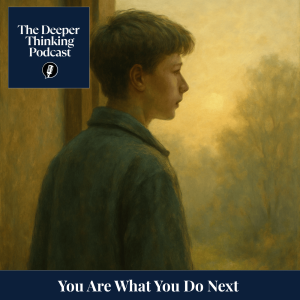
Thursday Jun 05, 2025
Thursday Jun 05, 2025
You Are What You Do Next : Freedom as a Loop - The Deeper Thinking Podcast
*Can we pause our systems before they swallow our agency?*
The Deeper Thinking Podcast
An exploration of freedom as the engineered loops of reflection that allow us to author our own lives.
What if freedom wasn’t a sudden burst of will but a cultivated practice of recursive loops? In this episode, we invoke Paul Ricoeur’s and Dan McAdams’s narrative‐identity theory, Judith Butler’s recognitive justice, and Shoshana Zuboff’s critique of surveillance capitalism to show how recursive agency emerges only when time, language, and social witness align. We draw on Harry Frankfurt’s second‐order desires and Thomas Hobbes’s compatibilism to argue that true freedom is the structured capacity to re‐enter our own actions, revise meaning, and move forward with clarity.
This is not a manifesto. It’s a journey through classrooms practicing restorative justice, prisons designed on humane principles, and digital platforms engineered with design theory to insert micro‐pauses. We examine how institutions—from Norwegian island prisons and Chicago’s restorative circles to social‐media throttles—either erode or enable loops that turn accountability into an ongoing practice of becoming.
About the Vignettes
Some of the vignettes are drawn from real programs, while others are illustrative composites meant to show how a “loop” might be built in different contexts. For example:
Chicago’s Restorative Circles really exist: schools that implement circle discussions in lieu of suspensions have been shown to reduce repeat behavior by roughly a third.
Norway’s low-security island prisons (e.g., Bastøy) operate with humane, social-worker-style staff and have recidivism rates well below those in most countries.
Social-media “friction” experiments (like one-second delays before a post can be shared) have been tested by platforms such as Twitter/X to lower impulsive reposts of hateful material.
Stock-market circuit breakers that pause trading at certain thresholds are a real form of enforced pause in finance.
Other examples—such as the Kyoto pharmacy mirror-sticker campaign, the Berlin QR-code crosswalk prompts, or the agricultural-cooperative voice-memo requirement—are not documented cases but are plausible, hypothetical designs that follow the same logic. They’re meant to illustrate how small pauses or “loops” could be embedded in everyday systems.
Reflections
Here are some reflections that surfaced along the way:
Freedom is not an all‐or‐nothing gift but a practice of revisiting and revising.
Recursive agency blossoms where time, vocabulary, and witnesses form an unbroken loop.
Compatibilism anchors choice in causation—but demands structural pause to flourish.
Institutions that refuse reflection collapse agency into reflex.
Loops are moral architecture: designed pauses that scaffold responsibility.
A society’s health is measured by how many “second‐draft” opportunities it affords.
Why Listen?
Discover a new theory of freedom as compatibilist moral authorship (e.g., how Norwegian island prisons insert deliberate reflective pauses).
See how restorative circles in Chicago classrooms cut repeat suspensions by a third through collective reflection.
Learn how social‐media platforms embed “digital friction” (e.g., one‐second delays) to reduce hateful reposts by nearly 40 percent.
Consider how design theory and civic interventions—like QR‐code “reflection poles” in Berlin—transform infrastructure into loops of care.
Listen On:
YouTube
Spotify
Apple Podcasts
Support This Work
If you’d like to support the ongoing work, visit buymeacoffee.com/thedeeperthinkingpodcast or leave a review on Apple Podcasts. Thank you.
Bibliography
Butler, Judith. Undoing Gender. Routledge, 2004.
Dewey, John. Experience and Education. Free Press, 1938.
Frankfurt, Harry G. The Importance of What We Care About. Cambridge University Press, 1988.
Goffman, Erving. Frame Analysis: An Essay on the Organization of Experience. Northeastern University Press, 1974.
Habermas, Jürgen. The Theory of Communicative Action, Volume 1. Beacon Press, 1984.
Hobbes, Thomas. Leviathan. Penguin Classics, 1985 (1651).
McAdams, Dan P. The Redemptive Self: Narrative Identity in America Today. Oxford University Press, 2006.
Pranis, Kay. Peacemaking Circles: From Crime to Community. Living Justice Press, 2005.
Ricoeur, Paul. Oneself as Another. University of Chicago Press, 1992.
Schön, Donald A. The Reflective Practitioner: How Professionals Think in Action. Basic Books, 1983.
Schwartz, Barry L., and Metcalfe, Janet. Tip-of-the-Tongue States and Memory Retrieval. Cambridge University Press, 2011.
Zuboff, Shoshana. The Age of Surveillance Capitalism: The Fight for a Human Future at the New Frontier of Power. PublicAffairs, 2019.
Bibliography Relevance
Judith Butler: Explores how recognitive justice shapes the social scaffolding necessary for agency.
John Dewey: Establishes the pragmatic lineage for reflection‐in‐action in education and democratic practice.
Harry Frankfurt: Introduces second‐order desires, anchoring self‐revision within ethical agency.
Erving Goffman: Provides a framework for how social “frames” structure our perception and re‐entry into interactive contexts.
Jürgen Habermas: Articulates the role of communicative action and discourse ethics in fostering collective reflection.
Thomas Hobbes: Offers the foundational compatibilist account of liberty as absence of external impediments, reframed here through design interventions.
Dan P. McAdams: Expands on narrative‐identity theory, illustrating how redemptive loops shape personal meaning over time.
Kay Pranis: Details restorative‐justice practices in community settings, exemplifying structural pauses for narrative repair.
Paul Ricoeur: Crafts the narrative‐identity framework showing how life is authored through revision and re‐reading of past actions.
Donald A. Schön: Offers design‐theory tools for embedding reflection in professional practice, crucial for digital and civic “loop” interventions.
Barry L. Schwartz & Janet Metcalfe: Provide cognitive‐science insights into memory retrieval and “tip‐of‐the‐tongue” states, illustrating the mechanics of reflection.
Shoshana Zuboff: Reveals how surveillance capitalism erodes micro‐loops of reflection in digital life, underscoring the urgency of pocketed pauses.
We are authors by redrafting, not by erasing: each loop we build is a chance to re-enter our own story.
#RecursiveAuthorship #FreedomLoop #ReflectiveAgency #DeeperThinkingPodcast #RestorativeJustice #DesignTheory #SurveillanceCapitalism #NarrativeIdentity #EducationalPauses #DigitalFriction
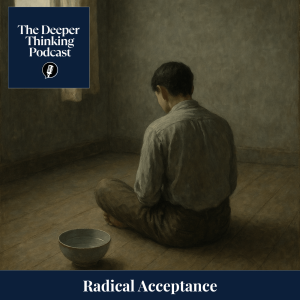
Wednesday Jun 04, 2025
Wednesday Jun 04, 2025
Radical Acceptance : A Discipline of Presence– The Deeper Thinking Podcast
The Deeper Thinking Podcast
Radical acceptance is not a gentle concession. It is not the quiet tolerance of what cannot be changed, nor the peaceful surrender to a world beyond one’s control. Rather, it is a confrontation with the real that resists interpretation. Unlike resignation, which drapes futility in soft cloth, radical acceptance offers no such comfort—it demands the stripping away of illusion, the standing bare before the incomprehensible, and the refusal to rewrite suffering into narrative closure. The temptation, always, is to place experience into a story that makes it digestible. But radical acceptance rejects that digestion. It is the choice to let what is, remain what is, without folding it into a redemptive arc.
Reflections
Sometimes, the most magnetic people are the ones who let us slow down.
Stillness can be a kind of trust—a way of staying with what hasn’t yet taken shape.
When we make peace with our own strangeness, others begin to bring theirs into the light.
Presence doesn’t need to announce itself. It holds space, quietly.
Listening, when done without urgency, becomes a form of shelter.
Why Listen?
Explore how presence—not performance—transforms attention into connection.
Learn how silence, ambiguity, and slowness enable deeper forms of meaning.
Engage with thinkers like Martin Buber and Simone Weil on ethics of presence.
Listen On
YouTube
Spotify
Apple Podcasts
Bibliography
Blanchot, Maurice. 1993. The Infinite Conversation. Translated by Susan Hanson. Minneapolis: University of Minnesota Press.
Butler, Judith. 2004. Precarious Life: The Powers of Mourning and Violence. London: Verso.
Camus, Albert. 1991. The Myth of Sisyphus and Other Essays. Translated by Justin O’Brien. New York: Vintage International.
Fuchs, Thomas. 2018. “Presence in Absence. The Ambiguity of Lived Space in Mourning.” Phenomenology and the Cognitive Sciences 17 (3): 531–549.
Geller, Jesse. 2017. “Radical Acceptance in Existential Psychotherapy.” Journal of Humanistic Psychology 57 (5): 401–424.
Gooding, Paul. 2020. “Refusing Closure: Aesthetics of the Unresolved in Contemporary Literature.” Textual Practice 34 (6): 961–980.
Han, Byung-Chul. 2015. The Burnout Society. Translated by Erik Butler. Stanford, CA: Stanford University Press.
Kristeva, Julia. 1989. Black Sun: Depression and Melancholia. Translated by Leon S. Roudiez. New York: Columbia University Press.
Laing, R.D. 1965. The Divided Self: An Existential Study in Sanity and Madness. New York: Pantheon Books.
Le Guin, Ursula K. 2004. “The Carrier Bag Theory of Fiction.” In Dancing at the Edge of the World, 165–170. New York: Grove Press.
Lingis, Alphonso. 1998. Dangerous Emotions. Berkeley: University of California Press.
Nhat Hanh, Thich. 1998. The Heart of the Buddha’s Teaching. New York: Broadway Books.
Scarry, Elaine. 1985. The Body in Pain: The Making and Unmaking of the World. New York: Oxford University Press.
Weil, Simone. 2002. Gravity and Grace. Translated by Emma Crawford and Mario von der Ruhr. London: Routledge.
Yalom, Irvin D. 1980. Existential Psychotherapy. New York: Basic Books.
Buber, Martin. 1970. I and Thou. Translated by Walter Kaufmann. New York: Scribner.
Rogers, Carl. 1980. A Way of Being. Boston: Houghton Mifflin.
Bibliography Relevance
Martin Buber: Offers a foundational model of relational dialogue as sacred encounter (I–Thou).
Simone Weil: Illuminates the ethical dimensions of attention as love.
Carl Rogers: Grounds the episode’s psychology of presence, safety, and authentic self-expression.
#PhilosophyOfPresence #MartinBuber #SimoneWeil #CarlRogers #SlowThinking #EthicalListening #QuietDepth #DeeperLife #SelfExpression #SpaceHolding #CharismaRedefined
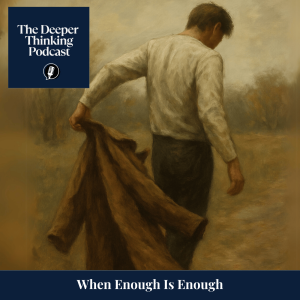
Tuesday Jun 03, 2025
Tuesday Jun 03, 2025
When Enough Is Enough – The Deeper Thinking Podcast
The Deeper Thinking Podcast
A meditation on burnout, worth, and the quiet rebellion of stopping.
What if burnout isn’t a failure of energy, but a clarity of vision? In this episode, we trace the contours of exhaustion—not as collapse, but as quiet refusal. Drawing from the work of Byung-Chul Han, Lauren Berlant, Maurice Merleau-Ponty, and Virginia Woolf, we explore how the ethic of constant optimisation fractures our sense of time, identity, and rest. This is an episode for anyone who has confused stillness with failure—and is beginning to suspect otherwise.
Instead of solutions, we offer attention. A new rhythm of presence. A permission to belong in your life without performing it. Through the philosophical lens of phenomenology, the emotional textures of burnout are re-read as signals of misalignment—not of ambition, but of inherited narratives about value, time, and selfhood.
Reflections
Here are some reflections that surfaced along the way:
Exhaustion isn’t weakness. Sometimes it’s the body's dissent.
You are not behind. You are bound to a rhythm that was never yours.
Stillness is not failure. It is refusal to be rendered.
Attention, not effort, is the ground of meaning.
Burnout is not just depletion—it’s the misrecognition of self as function.
Rest is not a reward. It is a right.
Why Listen?
Explore the quiet ontology of burnout without pathologising it
Reflect on phenomenological time and the violence of optimisation culture
Reclaim presence through stillness, not productivity
Reframe rest as an epistemic and ethical act
Listen On:
YouTube
Spotify
Apple Podcasts
Support This Work
If you’d like to support the ongoing work, you can visit buymeacoffee.com/thedeeperthinkingpodcast or leave a review on Apple Podcasts. Thank you.
Bibliography
Han, Byung-Chul. The Burnout Society. Stanford University Press, 2015.
Berlant, Lauren. Cruel Optimism. Duke University Press, 2011.
Merleau-Ponty, Maurice. Phenomenology of Perception. Routledge, 2012.
Woolf, Virginia. A Room of One’s Own. Hogarth Press, 1929.
Bibliography Relevance
Byung-Chul Han: Frames burnout as a pathology of hyperachievement and the disappearance of “the other.”
Lauren Berlant: Offers a lens into the emotional infrastructures that bind us to unsustainable forms of life.
Maurice Merleau-Ponty: Provides the phenomenological grounding for embodied presence and lived time.
Virginia Woolf: Captures the quiet ethics of autonomy, rest, and the politics of refusal through spatial metaphor.
To stop isn’t to disappear. It’s to reappear on your own terms.
#Burnout #ByungChulHan #LaurenBerlant #Phenomenology #MerleauPonty #VirginiaWoolf #TheDeeperThinkingPodcast #RestIsRadical #AttentionOverEffort #QuietRebellion #EthicsOfEnough
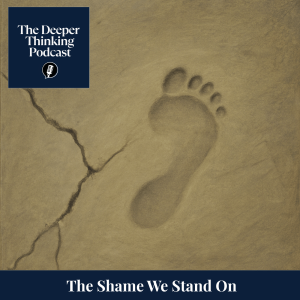
Monday Jun 02, 2025
Monday Jun 02, 2025
The Shame We Stand On – The Deeper Thinking Podcast
The Deeper Thinking Podcast
A recursive meditation on shame as epistemic ground, identity as performance, and healing as ontological disobedience.
What if shame wasn’t a feeling to overcome—but a structure we unknowingly stand on? In this episode, we explore the idea of ontological shame: a form of selfhood shaped not by momentary embarrassment but by systemic, inherited frameworks of erasure and expectation. Drawing from Judith Butler’s theory of performativity, Louis Althusser’s interpellation, and Michel Foucault’s theories of discipline, we consider how institutions, families, and cultural norms silently instruct us to disappear—and how healing begins when we refuse to obey.
This is not therapy-speak or pop-psychology. It is inquiry into how we come to mistake performance for personality, obedience for belonging, and perfection for safety. We follow shame not as symptom, but as infrastructure—asking what it means to unlearn the ground beneath our feet without losing the self we built upon it.
Reflections
Here are some reflections that surfaced along the way:
Shame isn’t carried. It’s stood on.
Ontology shapes identity before cognition can intervene.
The most dangerous scripts are the ones that feel like personality.
To heal is to betray the choreography shame taught you to perform.
Self-worth isn’t proven. It’s unlearned from conditions that never served it.
Stillness isn’t laziness. It’s refusal to audition for belonging.
Why Listen?
Engage with shame as epistemology, not just affect
Explore how identity is shaped by recursive social scripts
Learn what performative healing obscures—and how to move beyond it
Reflect on the cost of survival strategies mistaken for character
Listen On:
YouTube
Spotify
Apple Podcasts
Support This Work
If you’d like to support the ongoing work, you can visit buymeacoffee.com/thedeeperthinkingpodcast or leave a review on Apple Podcasts. Thank you.
Bibliography
Butler, Judith. Gender Trouble. Routledge, 1990.
Althusser, Louis. Lenin and Philosophy and Other Essays. Monthly Review Press, 1971.
Foucault, Michel. Discipline and Punish. Pantheon Books, 1977.
Gordon, Avery F. Ghostly Matters. University of Minnesota Press, 1997.
Bibliography Relevance
Judith Butler: Frames identity as performative and shaped by normative constraints
Louis Althusser: Explains how ideology interpellates individuals as subjects
Michel Foucault: Explores how institutions discipline through normative shame
Avery Gordon: Offers a lens on haunting and the spectral residues of internalised structures
Shame doesn’t just shape what we feel—it decides who we think we are allowed to become.
#OntologicalShame #JudithButler #Interpellation #Foucault #TheDeeperThinkingPodcast #Selfhood #Performativity #StructuralHealing #CulturalScripts #EmotionalPhilosophy
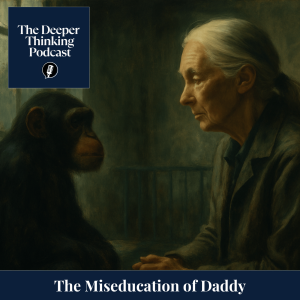
Sunday Jun 01, 2025
Sunday Jun 01, 2025
The Miseducation of Daddy – The Deeper Thinking Podcast
The Deeper Thinking Podcast
On intimacy as restraint, emotional fluency as miseducation, and the algorithmic performance of care. A slow unlearning of what it means to feel legibly.
What does it mean to be taught how to survive, not through love, but through legibility? In this episode, we examine the appearance of Jane Goodall on Call Her Daddy, not as a celebrity guest but as a case study in how therapeutic media platforms render pain aesthetically useful. Drawing from the work of Lauren Berlant and Judith Butler and contemporary theories of emotional performance, we ask: when did coherence become more important than truth?
This is not a takedown. It’s a reframe. A meditation on restraint as legacy, intimacy as performance, and the dangers of a culture that rewards women not for their truth, but for their narrative symmetry. We reflect on cruel optimism, surrogate ethics, and the algorithmic enforcement of coherence.
Reflections
Here are some reflections that surfaced along the way:
Insight is not integration—it is often a defense.
Not all pain is meant to be made legible.
Therapeutic culture may soothe us by disarming grief.
We admire coherence because contradiction demands care.
What we call healing may just be aesthetic restraint.
Why Listen?
Explore the emotional architecture of podcast intimacy
Understand how restraint is mistaken for dignity
Reconsider what gets edited out of every well-told trauma
Trace how platform aesthetics shape public emotion
Listen On:
YouTube
Spotify
Apple Podcasts
Support This Work
If you’d like to support the ongoing work, you can visit buymeacoffee.com/thedeeperthinkingpodcast or leave a review on Apple Podcasts. Thank you.
Bibliography
Berlant, Lauren. Cruel Optimism. Duke University Press, 2011.
Butler, Judith. Precarious Life. Verso, 2004.
Ahmed, Sara. The Cultural Politics of Emotion. Routledge, 2004.
Bibliography Relevance
Lauren Berlant: Shows how optimism can mask emotional stasis
Judith Butler: Frames emotional legibility as a form of social obedience
Sara Ahmed: Connects affect, institutional design, and public emotion
We do not mourn by naming. We mourn by refusing to perform.
#EmotionalLegibility #TherapeuticMedia #JaneGoodall #LaurenBerlant #JudithButler #OrnaGuralnik #NarrativeRestraint #PodcastAesthetics #TheDeeperThinkingPodcast
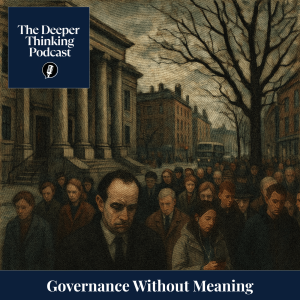
Saturday May 31, 2025
Saturday May 31, 2025
Governance Without Meaning – Why the System Still Functions Even as Public Trust Disappears
The Deeper Thinking Podcast
For those tracking the emotional, epistemic, and conceptual shifts reshaping public life.
What happens when institutions continue to operate but can no longer be interpreted? In this episode, we explore the quiet, often unseen reconstitution of governance—not through collapse or crisis, but through the slow erosion of shared metaphors, emotional coherence, and civic intelligibility. We trace how affect has replaced accountability, how performance has overtaken deliberation, and how trust now functions more as atmosphere than architecture.
This is not an episode about dysfunction. It’s about a system that works—in form—but no longer means. Drawing from political philosophy, philosophy of language, and affective politics, we map how governance has evolved from vision to calibration, from coherence to synchronization. With subtle nods to thinkers like Byung-Chul Han, Karen Barad, and Michel Foucault, we consider what happens when political meaning is displaced by tempo, optics, and mood.
We examine not only how public life is felt, but how it is formatted. From the evacuation of consequence to the saturation of language, from resilience as moral camouflage to legitimacy as narrative choreography—this is a meditation on systems that no longer collapse, but drift. The goal is not to restore belief, but to rethink the conditions under which belief might once again become possible.
Reflections
Here are some insights that surfaced along the way:
The system hasn’t failed—it’s recalibrated itself to function without meaning.
Public trust is no longer earned. It is engineered as ambiance.
Emotional stability now stands in for political legitimacy.
Language still performs—but increasingly, it does so without reference.
Resilience has become institutional decorum for managed abandonment.
Governance has become mood management under the guise of response.
The future is not a shared destination—it is a bandwidth to be moderated.
Silence is no longer avoidance. It is the space where concepts fail to cohere.
To critique is not to resist collapse—but to name the drift.
Why Listen?
Understand how governance persists even when meaning does not
Explore how attention, affect, and language have replaced ideology, coherence, and deliberation
Learn how systems simulate continuity while operating through symbolic inertia
Engage with Han, Barad, and Foucault on legibility, surveillance, and epistemic power
Listen On:
YouTube
Spotify
Apple Podcasts
Support This Work
If this episode resonates and you'd like to support future conversations, you can do so here: Buy Me a Coffee. Thank you for staying with the questions.
Bibliography
Han, Byung-Chul. Psychopolitics: Neoliberalism and New Power. Verso, 2017.
Barad, Karen. Meeting the Universe Halfway. Duke University Press, 2007.
Foucault, Michel. Discipline and Punish. Trans. Alan Sheridan. Vintage Books, 1995.
Bibliography Relevance
Byung-Chul Han: Frames how governance now operates through affect, visibility, and digital compliance.
Karen Barad: Offers a framework for understanding institutional entanglement, power, and meaning-making.
Michel Foucault: Illuminates the evolution of power from force to norm, from law to affective control.
Systems don’t need belief to function. They just need rhythm, ambiance, and the appearance of response.
#PoliticalPhilosophy #ByungChulHan #KarenBarad #Foucault #Governance #Trust #Meaning #InstitutionalDrift #CivicLife #MoodManagement #TheDeeperThinkingPodcast #Simulation #SemanticExhaustion

Friday May 30, 2025
Friday May 30, 2025
Ted or Dead
The Deeper Thinking Podcast
For those who refuse to arc. For those who resist formatting. For those who remain honest in the face of narrative coercion.
When survival becomes a story requirement, and healing must perform to be believed, what happens to those who can’t—or won’t—comply? In this episode, we examine how emotional life has been captured by performance culture. We explore the affective coercion embedded in storytelling frameworks like TED Talks, where trauma must arc, insight must inspire, and recovery must be visible to be valid. What if refusal isn’t dysfunction, but fidelity?
Drawing from Lauren Berlant’s notion of cruel optimism, Sara Ahmed’s work on affective economies, and Judith Butler’s ethics of intelligibility, we reconsider what it means to live truthfully when formatting becomes mandatory. Refusing to arc becomes an act of epistemic resistance.
This is not a celebration of dysfunction, but a meditation on the hidden violence of legibility. The essay makes space for silence, for narrative disobedience, for truths that cannot be shaped into slides. It’s not TED. It’s not Dead. It’s the grey zone in between—the unstageable, unperformable self that still demands to be known.
Reflections
Some truths lose their integrity the moment they arc.
Refusal is not failure. It’s fidelity to something deeper than narrative.
Survival doesn’t always look like resolution. Sometimes it looks like staying silent.
Adaptation is not always healing. It is sometimes erasure.
There is nothing wrong with not being TED-ready.
Why Listen?
Interrogate the emotional politics of public storytelling
Explore what cruel optimism looks like in trauma narratives
Learn how narrative structures can suppress complex or ongoing harm
Engage with Butler, Ahmed, and Berlant on affect, legibility, and resistance
Listen On:
YouTube
Spotify
Apple Podcasts
Support This Work
If this episode resonated and you’d like to support more slow, careful work like this, you can do so here: Buy Me a Coffee.
Bibliography
Berlant, Lauren. Cruel Optimism. Duke University Press, 2011.
Ahmed, Sara. The Cultural Politics of Emotion. Edinburgh University Press, 2004.
Butler, Judith. Giving an Account of Oneself. Fordham University Press, 2005.
Bibliography Relevance
Lauren Berlant: Illuminates how hope becomes coercion when survival is aestheticized.
Sara Ahmed: Maps how emotion circulates socially, privileging visibility over integrity.
Judith Butler: Challenges how the demand for narrative legibility often erases complex truths.
In a world that wants your arc, sometimes the most radical thing you can do is stay jagged.
#TraumaNarrative #LaurenBerlant #SaraAhmed #JudithButler #TEDTalks #NarrativeEthics #Adaptation #EmotionalLegibility #TheDeeperThinkingPodcast
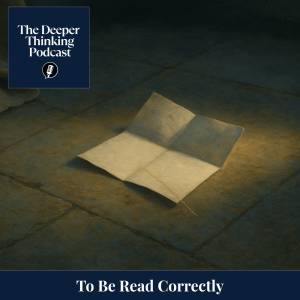
Thursday May 29, 2025
Thursday May 29, 2025
To Be Read Correctly: Autism, ADHD, and the Architecture of Misrecognition
The Deeper Thinking Podcast
For listeners drawn to neurodivergence, diagnostic ethics, and the redesign of perception itself.
What happens when a diagnosis comes not as revelation, but as restitution? In this episode, we explore the late discovery of Autism and ADHD—not as deficits to be managed, but as architectures of experience long misinterpreted by the systems meant to support them. Drawing from narrative medicine, disability studies, and the philosophy of epistemic injustice, we ask what it means to finally be read correctly—and what it costs to have been misread for so long.
This is not an episode about coping mechanisms or late-blooming self-discovery. It is a meditation on masking as critique, burnout as design failure, and joy as diagnostic signal. With quiet nods to thinkers like Devon Price, Gabor Maté, and Damian Milton, we explore how diagnostic delay reshapes identity—and how diagnosis, when framed ethically, becomes a blueprint for rebuilding the social contract around different ways of sensing, thinking, and being.
Reflections
Here are some reflections that surfaced along the way:
Diagnosis is not identity—it is the removal of misidentity.
Masking isn’t performance. It’s what happens when intelligibility becomes a survival skill.
Burnout isn’t fragility. It’s the receipt for years of misinterpretation.
Being “read correctly” is not a gift. It’s a late correction to a structural silence.
Joy can be diagnostic. So can precision, stimming, stillness, and refusal.
Systems don’t just misread neurodivergent people. They are built not to read them at all.
The opposite of dysfunction is not normalcy. It’s being held in a space designed for your signal to emerge.
To unmask is not to become visible—it’s to stop being rewritten.
Why Listen?
Reframe Autism and ADHD as forms of epistemic clarity, not clinical deviation
Explore how diagnosis functions as narrative repair
Understand misrecognition as a structural—not personal—injury
Engage with thinkers like Fricker, Price, and Maté on late diagnosis, masking, and the ethics of recognition
Listen On:
YouTube
Spotify
Apple Podcasts
Support This Work
If this episode stayed with you and you’d like to support the ongoing work, you can do so here: Buy Me a Coffee. Thank you.
Bibliography
Price, Devon. Unmasking Autism. Harmony Books, 2022.
Maté, Gabor. The Myth of Normal. Avery, 2022.
Milton, Damian. “The Double Empathy Problem.” Autism, 2012.
Fricker, Miranda. Epistemic Injustice. Oxford University Press, 2007.
Bibliography Relevance
Devon Price: Frames autism as a valid identity and critiques masking as survival labor.
Gabor Maté: Connects ADHD to trauma and systemic overwhelm, not moral failing.
Damian Milton: Introduces the “double empathy problem” as a mutual misreading, not individual deficit.
Miranda Fricker: Provides a foundational theory of epistemic injustice—being disbelieved or misread because of who you are.
To be read correctly is not a diagnosis. It is the quiet return of narrative sovereignty.
#Autism #ADHD #Neurodiversity #Diagnosis #EpistemicInjustice #DevonPrice #GaborMate #DamianMilton #Masking #NarrativeRepair #DoubleEmpathy #TheDeeperThinkingPodcast
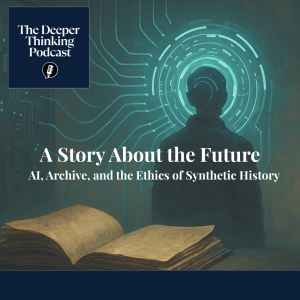
Wednesday May 28, 2025
Wednesday May 28, 2025
A Story About the Future: AI, Archive, and the Ethics of Synthetic History
The Deeper Thinking Podcast
For listeners drawn to epistemic tension, technological haunting, and the quiet violence of perfect memory.
What happens when machines remember better than we do? In this episode, we examine the quiet transformation of memory into simulation, where generative AI reconstructs the past—not as evidence, but as emotional interface. Drawing from post-structuralism, trauma theory, and the philosophy of the archive, we explore what is lost when remembering is outsourced to systems that cannot forget.
This is not a cautionary tale about misinformation. It is a meditation on Ricoeur’s notion of fragile memory, Derrida’s archive fever, and Stiegler’s concept of prosthetic cognition. With echoes of Karen Barad and Susan Sontag, we ask: what kind of truth survives when memory becomes performance? And what ethical refusal remains when even our forgetting is erased?
As AI systems begin to dream in historical cadence, this episode steps outside coherence. It walks slowly through the unrendered zone—where testimony resists resolution, and memory no longer wants to be believed. This is not about what happened. It is about what should not have been remembered so perfectly.
Reflections
Here are some quiet realizations that emerged:
The past rendered too cleanly is no longer ours—it’s the model’s.
Grief, when sequenced for resonance, loses its rupture.
Truth doesn’t vanish—it rehearses itself into silence.
The ache of forgetting isn’t loss—it’s ethical space.
Some stories shouldn’t resolve. Their refusal is their resistance.
We don’t remember alone. But we can forget together.
When memory becomes service, remembrance becomes surrender.
The most radical act may be to misremember with care.
To pause before resolving the past may be the last unsimulated gesture we have.
Why Listen?
Explore synthetic memory and its emotional calibration
Consider the ethics of generative history and archival recursion
Reflect on forgetting as a philosophical and political act
Engage thinkers like Ricoeur, Derrida, Stiegler, Sontag, and Barad
Listen On:
YouTube
Spotify
Apple Podcasts
Support This Work
If this episode lingered with you, you can support the work here: thedeeperthinkingpodcast.com. Your support sustains slower, stranger thinking.
Bibliography
Ricoeur, Paul. Memory, History, Forgetting. University of Chicago Press, 2004.
Derrida, Jacques. Archive Fever. University of Chicago Press, 1996.
Stiegler, Bernard. Technics and Time. Stanford University Press, 1998.
Sontag, Susan. Regarding the Pain of Others. Farrar, Straus and Giroux, 2003.
Barad, Karen. Meeting the Universe Halfway. Duke University Press, 2007.
Bibliography Relevance
Paul Ricoeur: Memory as narrative construction, always fragile and ethically charged.
Jacques Derrida: The archive as an architecture of power and forgetting.
Bernard Stiegler: Technologies as prostheses for memory and time.
Susan Sontag: The ethics of witnessing and the aestheticization of suffering.
Karen Barad: Reality as intra-actively shaped—memory as co-constructed phenomena.
The most dangerous memory may not be what’s lost—but what’s returned too perfectly.
#SyntheticMemory #Ricoeur #Derrida #Barad #Sontag #Stiegler #PosthumanEpistemology #ArchiveEthics #TheDeeperThinkingPodcast #AIandHistory #NonResolution #QuietRefusal









